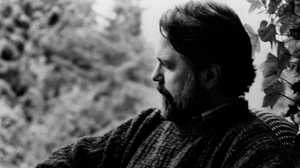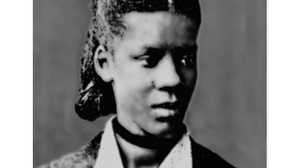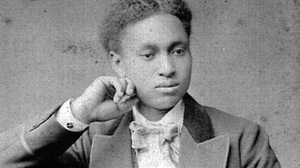Frederick J. Loudin, Baritone

Frederick Jeremiah Loudin's commanding presence and ambitious personality caused him to emerge as an unofficial spokesperson for the Jubilee Singers during the four years he toured with them. He later became internationally famous as the leader his own band of Jubilee Singers all over the world.
Loudin was born to free parents in the late 1830s or early 1840s. His parents had moved to rural Ohio to be farmers, but when they encountered racial discrimination at area schools, Loudin’s mother took the children to the town of Ravenna to be educated. Loudin became a strong student and in his late teens began apprenticing for a printer. When asked to take over the literary department of the abolitionist newspaper for which he worked, Loudin elected to remain a compositer since he did not fully share the views of the paper's editor. Discouraged when he discovered that other white printers were unwilling to do business with him, Loudin gave up printing altogether.
The racism he experienced extended beyond school and work. In the Methodist church he had joined in Ravenna, Loudin was prohibited from singing in the choir. This was especially disappointing since Loudin, who had descended from a family of musicians, was gifted with a beautiful voice. This experience discouraged him from pursuing a formal education in music, despite his desire to sing.
While in his early 20s, Loudin moved to Pittsburgh where he met and married Harriet Johnson. Four years later, the couple moved to Memphis. Music played a large part in Loudin's life: teaching, learning the organ and leading a choir. When a friend told him about the Jubilee Singers, he wrote to George White. White, who was looking for a baritone, came to Memphis to hear Loudin sing. He invited him to join his choir.
Loudin, the oldest member of the Jubilee Singers, forged a strong relationship with George White over the next few years while touring Europe. A bitter rival of Ella Sheppard, he also fell out with Erastus Milo Cravath, Fisk’s president, over the Jubilees’ rights to rest and remuneration.In 1879, after the Jubilee Singers disbanded, Loudin and White reorganized the choir together, calling it the Fisk Jubilee Singers for the sake of name recognition though the group was no longer associated with Fisk University. After White was injured while directing the troupe at Chattaqua, New York, the group continued on a two-year tour of the U.S. and Canada.
In 1884 Loudin launched a six-year world tour. As sole director of the choir, Loudin became particularly careful about selecting his singers, investigating their backgrounds to ensure they had committed no misdeeds and that they came from cultured families. As a group now purely composed of and run by African Americans, it was important to Loudin that no character flaws could be pointed to as proof of their inferiority. Loudin led his choir to England, Ireland, Australia, New Zealand, India, Singapore, China, Japan, and finally across the American West. The success of this tour -- Loudin and his singers earned enough to settle comfortably upon their return -- was partly due to its management by Loudin's wife, who had traveled with him since his Jubilee Singers days. After returning to his hometown of Ravenna, Ohio and building his family a house, Loudin continued to tour with his troupe for the next twelve years.
In addition to meeting the demands required by his career as a singer and choir director, Loudin somehow found time for political and business pursuits. In the 1890s, after returning from his world tour, Loudin became the owner of two shoe manufacturing companies and patented two inventions. In 1879, and again in 1893, he served as a delegate to a national conference of black men, and in 1893. He joined anti-lynching journalist Ida B. Wells-Barnett and Frederick Douglass in advocating for the representation of African Americans at the World’s Columbian Exposition in Chicago. Loudin also maintained his relationship with Fisk throughout his life -- sending the school regular updates on his choir's work abroad and visiting the school whenever he could -- despite the fact he was never a student there.
Loudin collapsed while on tour in Scotland during the fall of 1902, almost thirty years after he had first joined the Jubilee Singers. He died in Ravenna two years later.







